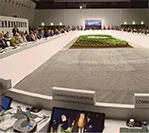LESSONS FOR ASEAN: Governments must work together to foster a common sense of belonging among their respective populations
AT the Clacton by-election last week, Douglas Carswell, candidate for the United Kingdom Independence Party (Ukip), won the seat by more than 12,000 votes, and the same party nearly grabbed another seat in Heywood and Middleton.
Ukip leader Nigel Farage — once regarded as a lone voice from the political wilderness, whose party was not taken seriously — has now vowed to work even harder as Ukip campaigns in Kent and hopes to win more seats in the coming by-elections, and the national elections that will come later.
Both the Conservative and Labour Parties seem at a loss to blunt the advances of Ukip, which has been campaigning against both foreign immigration as well as European interference in British affairs, and which calls for the United Kingdom to regain its “independence” against European Union (EU) “intervention”. It would be far-fetched to suggest that the EU has “colonised” the UK, or any other EU country, for that matter, but we must also ask how and why a party like Ukip, which is vehemently anti-EU, could have raked in such dividends under the present circumstances.
That such sentiments can be mouthed openly today tells us something about the state of local politics and how it is driven by immediate domestic concerns at present. The Scottish referendum, which saw a narrow victory for the “Yes” camp, was another instance where we see the rise of local politics in Europe, and where the union of Britain nearly came apart, thanks to rising domestic demands for autonomy and economic independence.
In both cases, it is important to note that these calls for separation and isolation took place in a country that can only be regarded as developed and economically powerful (compared to the developing world, that is) and, yet, where primordial attachments to ethnicity, locality, local identity and history remain strong. So, what is really happening, and what does this entail for the process of regional integration in Europe and elsewhere?
For us in the Asean region, the lessons from the Scottish referendum and the sudden rise of parties like Ukip are instructive in many ways.
For starters, they remind us of the fact that economic development and material wealth do not necessarily point to the eclipse of more fundamental, essential primordial attachments to the past. The oft-repeated notion that economic development would broaden minds, open horizons, and expand vistas for social mobility and upward economic-social advancement is not always true, particularly in cases where economic development via regional integration has not led to the betterment of ordinary lives.
In many parts of Europe, European integration was seen as an elite-led, capital-driven process that did not necessarily benefit the ordinary working masses in some of the poorer countries. The compounded effect of a string of economic crises — from Spain to Greece to Portugal — has left the EU reeling from the contagious nature of such collapses, and in countries like Germany, ordinary citizens have been asking aloud why their taxpayers’ money ought to be used to bail out ailing European economies that were not as financially prudent as their own.
Secondly, these developments show that unless and until there is a genuine sense of regional belonging and common identity forged among such nations and peoples, state-led integration occurs only on the economic level and involves only the development of a common economic-legal infrastructure that has little impact on the lives of people. Despite its long and complex genesis and evolution, the EU seems a pipe-dream for many, and the developments in Scotland and England — mirrored by similar developments in other parts of Europe — give us cause to pause and ask: is European integration a real, substantial thing that impacts the lives and mindset of ordinary people?
These questions are timely for us in the Asean region as the coming year will witness the advent of the Asean Economic Community, which may well face a similar backlash in some countries if it is not handled carefully.
Coming at a time when the Southeast Asian region is being propelled to the foreground of geopolitics and geo-security — thanks in part to the increasingly visible presence of China and the United States, and their rivalry in the region — the nation-states of Asean seem divided and unprepared for the sociocultural and socioeconomic impact of economic integration, if it is to take place at all.
More worrying still are the calls for protectionism that we hear in some Asean countries, couched in terms of a nationalist rhetoric that views all foreign capital, including inter-Asean investment, as hostile and predatory.
One lesson that can be learned from the EU experience is that multi-state integration has to be accompanied by confidence-building, and the nurturing of familiarity and a common identity among the citizenry of the respective countries.
It was the failure to do so effectively that partly contributed to the backlash that we have seen in some EU countries at present.
As Asean heads towards its own appointed goal of economic integration next year, the governments of the region really need to work together to foster a common sense of Asean homeliness and belonging among their populations or face the prospect of localised anti-integration backlashes in their own backyard.
Article by Farish Noor which appeared in New Straits Times, Oct. 13, 2014





